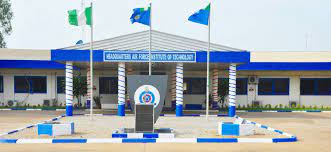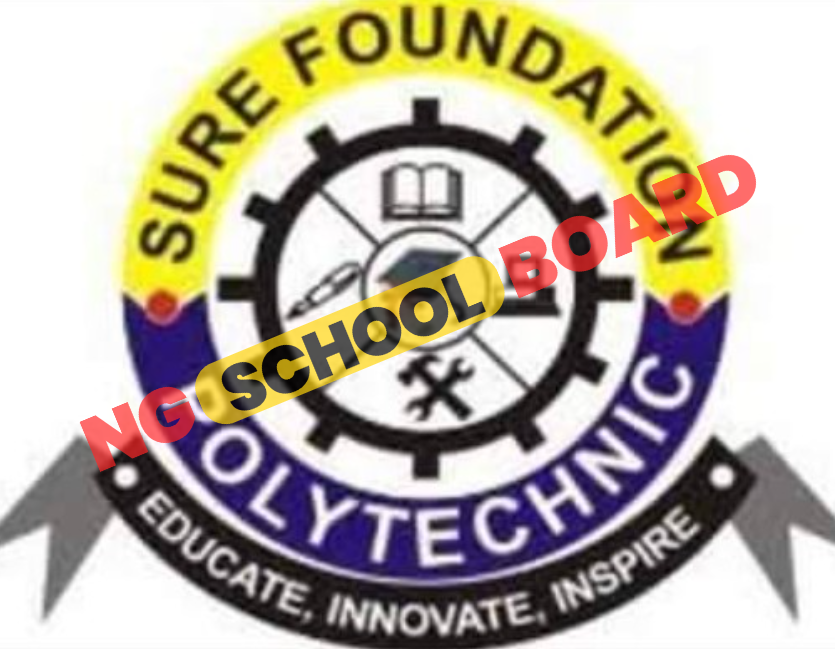Are you interested in knowing the Air Force Institute of Technology School Fees? Here is the last bus stop as Air Force Institution of Technology School Fees matches its academic excellence.
In this post, I will go into the AFIT’s history, its rigorous admission standards, diverse academic programs, modern facilities, and the estimated annual expenses you need to budget for .
Stay with me as I give you the full details.

Air Force Institute of Technology: Overview
When it comes to the world of aviation and aerospace engineering, excellence is paramount.
In the heart of Kaduna, Nigeria, the Air Force Institute of Technology (AFIT) stands as a beacon of brilliance.
Established in 1977, AFIT has earned its reputation as the premier institution for the training of air force officers and engineers in Nigeria.
The AFIT is not just another educational institution; it’s a highly selective one. To be part of this prestigious institute, candidates must meet stringent criteria:
1. Nigerian Citizenship
To embark on your journey at AFIT, you must be a Nigerian citizen.
2. Academic Prowess
Candidates are expected to hold a minimum of five (5) credit passes in the Senior School Certificate Examination (SSCE) or its equivalent.
3. Impressive Academic Record
A minimum of 2.5 CGPA in the SSCE or its equivalent is required to be considered for admission.
4. Success in the AFIT Entrance Examination
Passing the AFIT entrance examination is another essential step in securing a spot at this esteemed institution.
Air Force Institute of Technology School Fees
When embarking on a journey of higher education, it’s essential to consider not only the quality of the institution but also the financial aspects. At the Air Force Institute of Technology (AFIT), the tuition fees and associated costs play a pivotal role in shaping the educational experience. In this section, we’ll explore the tuition fees for various programs at AFIT for the 2022/2023 academic session and shed light on financial assistance opportunities.
Tuition Fees Breakdown
For the 2022/2023 academic session, AFIT has structured its tuition fees in a manner that reflects its commitment to accessible education. The tuition fees for undergraduate and postgraduate programs are as follows:
Undergraduate Programs:
- Bachelor of Science in Aerospace Engineering: N120,000 per year
- Bachelor of Science in Mechatronics Engineering: N120,000 per year
- Bachelor of Science in Avionics Engineering: N120,000 per year
Postgraduate Programs:
- Master of Science in Aerospace Engineering: N150,000 per year
- Master of Science in Mechatronics Engineering: N150,000 per year
- Master of Science in Avionics Engineering: N150,000 per year
Additional Fees
In addition to tuition fees, students at AFIT are required to cover several other fees, which are essential for a holistic educational experience. These fees include:
- Acceptance fee: N20,000: Paid at the beginning of the academic journey to secure admission.
- Matriculation fee: N1,200: An integral part of the matriculation ceremony, signifying official enrollment.
- Examination fee: N5,000: Supporting the administration of examinations and assessments.
- Library fee: N2,000: Ensuring access to a well-equipped library for research and learning.
- Sports fee: N1,000: Promoting physical well-being and sports activities on campus.
- Medical fee: N1,000: Supporting healthcare services for students’ well-being.
Estimating the Total Cost
The total cost of attending AFIT can vary based on several factors, including the program of study and the number of years required to complete the degree.
Generally, students can estimate their annual expenses to fall within the range of N200,000 to N300,000 per year.
This estimate encompasses tuition fees and the additional fees mentioned above.
Here’s a summarized tabular representation of the tuition fees and additional costs at the Air Force Institute of Technology (AFIT):
| Program | Tuition Fees (Per Year) |
|---|---|
| Bachelor of Science in Aerospace Engineering | N120,000 |
| Bachelor of Science in Mechatronics Engineering | N120,000 |
| Bachelor of Science in Avionics Engineering | N120,000 |
| Master of Science in Aerospace Engineering | N150,000 |
| Master of Science in Mechatronics Engineering | N150,000 |
| Master of Science in Avionics Engineering | N150,000 |
Additional Fees:
| Fee | Amount |
|---|---|
| Acceptance Fee | N20,000 |
| Matriculation Fee | N1,200 |
| Examination Fee | N5,000 |
| Library Fee | N2,000 |
| Sports Fee | N1,000 |
| Medical Fee | N1,000 |
Air Force Institute of Technology School Fees: Financial Assistance
AFIT recognizes the importance of financial assistance in ensuring that deserving students have access to quality education. To this end, the AFIT Scholarship Board offers scholarships to eligible students. These scholarships are awarded based on various criteria, including academic merit, financial need, and other relevant factors.
For those aspiring to join AFIT but concerned about the financial aspect, applying for scholarships through the AFIT Scholarship Board can be a crucial step. It not only eases the burden of tuition fees but also recognizes and rewards students who excel academically and demonstrate financial need.
In conclusion, while the costs associated with higher education are a consideration, AFIT’s commitment to accessible education, coupled with opportunities for financial assistance, ensures that aspiring air force officers and engineers have the chance to pursue their dreams without undue financial stress. It’s a testament to AFIT’s dedication to producing the best and brightest in the field of aerospace engineering.
For more information on tuition fees and financial assistance, please visit the AFIT website.
In addition to the above, below are some key factors to consider and tips for budgeting for school fees at the Air Force Institute of Technology (AFIT)
Air Force Institute of Technology School Fees: Factors to Consider When Budgeting
Program of Study: Tuition fees vary depending on the program you choose.
For instance, the Bachelor of Science in Aerospace Engineering has a tuition fee of N120,000 per year, while the Master of Science in Aerospace Engineering costs N150,000 per year.
Duration of the Program: The total cost of attendance is influenced by the number of years it takes to complete your degree.
Bachelor’s programs generally take 4 years, while master’s programs often take 2 years.
Additional Fees: Besides tuition, there are additional fees to consider, including acceptance fees, matriculation fees, examination fees, library fees, sports fees, and medical fees.
Financial Assistance: Explore available financial assistance options, such as scholarships, grants, and loans, as they can help offset educational expenses.
Tips for Budgeting:
- Early Planning: Start planning your budget well in advance. This allows you to research and apply for financial assistance options that may be available to you.
- Realistic Budget: Create a budget that realistically covers all your expenses, including tuition, fees, and living expenses like transportation, food, and housing. Being thorough in your budgeting will help you avoid financial stress.
- Flexibility: Be prepared for unexpected changes in your financial situation. Your budget may need to adapt to unforeseen circumstances, so it’s important to remain flexible.
- Seek Help: Don’t hesitate to seek guidance and assistance. There are resources available, such as financial aid offices and counselors, who can provide valuable information and support in managing your educational expenses.
Incorporating these factors and tips into your financial planning will help ensure that you can comfortably manage the costs associated with your education at AFIT while pursuing your academic and career goals.
Air Force Institute of Technology: Academic Offerings
Among the notable programs are:
Undergraduate Programs:
- Bachelor of Science in Aerospace Engineering
- Bachelor of Science in Mechatronics Engineering
- Bachelor of Science in Avionics Engineering
Postgraduate Programs:
- Master of Science in Aerospace Engineering
- Master of Science in Mechatronics Engineering
- Master of Science in Avionics Engineering
Academic Offerings in Details
AFIT offers a wide array of undergraduate and postgraduate programs, covering various facets of aerospace engineering and technology. Some of the prominent programs include:
- Bachelor of Science in Aerospace Engineering: This program equips students with the knowledge and skills needed to design and maintain cutting-edge aircraft.
- Bachelor of Science in Mechatronics Engineering: Focusing on the integration of mechanical, electrical, and computer engineering, this program produces engineers ready to tackle complex mechatronic systems.
- Bachelor of Science in Avionics Engineering: With a focus on aviation electronics and communication systems, this program prepares students for a career in avionics technology.
- Master of Science in Aerospace Engineering: Designed for those looking to go deeper into aerospace technology, this program offers advanced knowledge and research opportunities.
- Master of Science in Mechatronics Engineering: For those seeking expertise in the fusion of mechanical and electronic systems, this program paves the way.
- Master of Science in Avionics Engineering: This program further enhances knowledge in avionics systems and technology, making graduates highly sought-after.
In addition to these comprehensive programs, AFIT provides a variety of short courses and workshops designed to enrich the knowledge and skills of military and civilian personnel alike.
Such as;
A Campus of Excellence
AFIT’s commitment to excellence extends to its campus and facilities.
The institute boasts modern amenities, including a well-equipped library, state-of-the-art laboratories, and workshops.
These resources create an environment conducive to both learning and research.
A Hub of Innovation
Innovation is at the heart of AFIT’s mission.
The institute actively engages in research and development, contributing to the advancement of aerospace technologies for the Nigerian Air Force and beyond.
A Path to Success
Graduates of AFIT are in high demand, not only by the Nigerian Air Force but also by other employers seeking leaders and innovators in the aerospace engineering field.
A Stalwart in Nigerian Education
AFIT is more than just an educational institution; it is a symbol of excellence in the field of aerospace engineering and technology.
More so, recognized and affiliated with the National Universities Commission (NUC), AFIT has consistently delivered world-class education for over four decades.
Its commitment to producing top-tier air force officers and engineers has solidified its position as a trailblazer in the realm of military education.
Beyond Academics
AFIT goes beyond the conventional classroom experience.
The institute offers a variety of short courses and workshops tailored for both military personnel and civilians.
These courses not only enhance the skills of individuals but also contribute to the development of the aerospace industry in Nigeria.
State-of-the-Art Facilities
To foster a conducive learning environment, AFIT boasts modern facilities, including a well-stocked library, cutting-edge laboratories, and workshops equipped with the latest technology.
These resources empower students to engage in hands-on learning and innovative research.
Pioneering Research
AFIT is not just a place of learning; it’s a hub of innovation.
The institute is actively engaged in pioneering research projects, driving the development of new technologies for the Nigerian Air Force.
This commitment to innovation ensures that AFIT remains at the forefront of aerospace engineering advancements.
Air Force Institute of Technology Admissions Challenge
At AFIT, excellence is not an option; it’s the standard.
As such, the institute maintains stringent admission requirements to ensure that only the best and brightest candidates gain entry.
Prospective students must meet the following prerequisites:
- Nigerian Citizenship: Applicants must be Nigerian citizens, displaying their dedication to serving their country.
- Academic Prowess: A minimum of five (5) credit passes in the Senior School Certificate Examination (SSCE) or its equivalent is required. This underscores the institute’s commitment to academic excellence.
- Impressive GPA: A minimum CGPA of 2.5 in the SSCE or equivalent demonstrates the need for scholarly dedication.
- Passing the AFIT Entrance Examination: A crucial step in the selection process, this examination ensures that only the most qualified candidates are admitted.
Air Force Institute of Technology: Pros and Cons
No institution is without an advantage and disadvantages.
As you are planning on switching or gaining admission to any institution, you need to ask yourself what will you gain, and what are the bad side of the institution.
Thus; here is the summary of the pros and cons of attending the Air Force Institute of Technology (AFIT)
Pros:
- High-Quality Education: AFIT is renowned for providing a top-tier education, particularly in aerospace engineering, mechatronics engineering, and avionics engineering, ensuring students receive a quality learning experience.
- Research Opportunities: AFIT’s robust research program offers students valuable opportunities to engage in research projects, fostering academic growth and innovation.
- Job Security: Graduates of AFIT are in high demand, especially within the Nigerian Air Force and other potential employers, providing a strong sense of job security.
- Financial Assistance: AFIT offers various financial assistance options, including scholarships, grants, and loans, making education more accessible to students.
- Military Benefits: Students at AFIT can access a range of military benefits, including healthcare, housing, and food, contributing to their overall well-being.
Cons:
- Military Commitment: Attending AFIT comes with the obligation to serve in the Nigerian Air Force for a specified period after graduation, which may not align with everyone’s career goals.
- Tuition Fees: The tuition fees at AFIT are relatively high, and students should carefully assess their financial capacity before enrolling.
- Location: AFIT is situated in Kaduna, a relatively remote city, which might not be ideal for those accustomed to urban environments.
- Discipline: Students at AFIT are subject to military discipline, which includes adherence to strict rules and regulations.
When deciding whether to attend AFIT, individuals should consider several factors:
- Personal Goals: Reflect on your career aspirations and whether AFIT aligns with your long-term objectives.
- Financial Situation: Evaluate your ability to cover tuition fees and other associated expenses comfortably.
- Family Support: Consider whether your family is supportive of your decision to attend AFIT, as their support can be crucial.
- Military Service Willingness: Assess your willingness to fulfill the military commitment required after graduation, as it’s a fundamental part of the AFIT experience.
In conclusion, attending the Air Force Institute of Technology (AFIT) is a significant decision that should be made after careful consideration of both the advantages and disadvantages, taking into account your individual goals, financial circumstances, and personal preferences.
Conclusion
In conclusion, the Air Force Institute of Technology is not just an institution; it’s a symbol of excellence, innovation, and dedication.
With its rigorous admission standards, diverse academic programs, modern facilities, and a legacy of distinguished alumni, AFIT is poised to continue shaping the future of aerospace engineering in Nigeria.
As it soars to new heights, AFIT remains unwavering in its commitment to producing world-class air force officers and engineers who will serve the nation with distinction.
The Air Force Institute of Technology (AFIT) stands as a beacon of educational excellence, dedicated to shaping the future of air force officers and engineers in Nigeria.
With its commitment to academic rigor, innovation, and a legacy of notable alumni, AFIT remains a premier institution of higher learning in the country.
Therefore, AFIT is funded by the Nigerian government, ensuring its continued commitment to excellence in education and research.
Also See;
Franco British International University School Fees 2023
Azman University School Fees 2024/2025
Hello, I’m Chineye, an article writer passionate about the written word. I specialize in crafting engaging and informative articles that tell stories, share insights, and spark curiosity. Through my writing, I aim to connect with readers, foster a love for learning, and explore the diverse tapestry of human experiences. Join me on this literary journey, where every article is a new adventure waiting to be explored.





